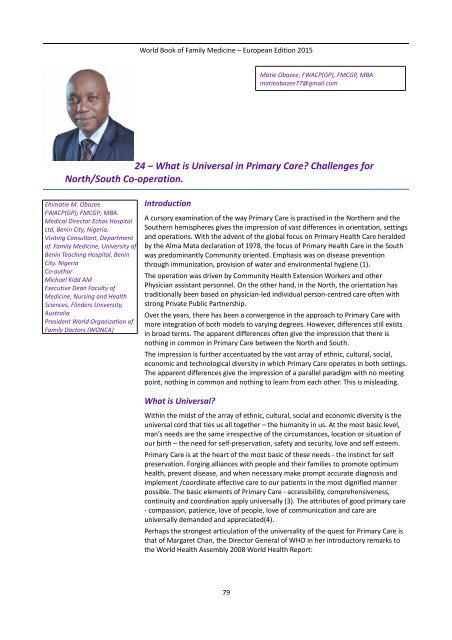Family Medicine
World Book 2015
World Book 2015
Create successful ePaper yourself
Turn your PDF publications into a flip-book with our unique Google optimized e-Paper software.
World Book of <strong>Family</strong> <strong>Medicine</strong> – European Edition 2015<br />
Matie Obazee, FWACP(GP), FMCGP, MBA<br />
matieobazee77@gmail.com<br />
24 – What is Universal in Primary Care? Challenges for<br />
North/South Co-operation.<br />
Ehimatie M. Obazee<br />
FWACP(GP); FMCGP; MBA.<br />
Medical Director Echos Hospital<br />
Ltd, Benin City, Nigeria.<br />
Visiting Consultant, Department<br />
of. <strong>Family</strong> <strong>Medicine</strong>, University of<br />
Benin Teaching Hospital, Benin<br />
City. Nigeria<br />
Co-author<br />
Michael Kidd AM<br />
Executive Dean Faculty of<br />
<strong>Medicine</strong>, Nursing and Health<br />
Sciences, Flinders University,<br />
Australia<br />
President World Organization of<br />
<strong>Family</strong> Doctors (WONCA)<br />
Introduction<br />
A cursory examination of the way Primary Care is practised in the Northern and the<br />
Southern hemispheres gives the impression of vast differences in orientation, settings<br />
and operations. With the advent of the global focus on Primary Health Care heralded<br />
by the Alma Mata declaration of 1978, the focus of Primary Health Care in the South<br />
was predominantly Community oriented. Emphasis was on disease prevention<br />
through immunization, provision of water and environmental hygiene (1).<br />
The operation was driven by Community Health Extension Workers and other<br />
Physician assistant personnel. On the other hand, in the North, the orientation has<br />
traditionally been based on physician-led individual person-centred care often with<br />
strong Private Public Partnership.<br />
Over the years, there has been a convergence in the approach to Primary Care with<br />
more integration of both models to varying degrees. However, differences still exists<br />
in broad terms. The apparent differences often give the impression that there is<br />
nothing in common in Primary Care between the North and South.<br />
The impression is further accentuated by the vast array of ethnic, cultural, social,<br />
economic and technological diversity in which Primary Care operates in both settings.<br />
The apparent differences give the impression of a parallel paradigm with no meeting<br />
point, nothing in common and nothing to learn from each other. This is misleading.<br />
What is Universal?<br />
Within the midst of the array of ethnic, cultural, social and economic diversity is the<br />
universal cord that ties us all together – the humanity in us. At the most basic level,<br />
man’s needs are the same irrespective of the circumstances, location or situation of<br />
our birth – the need for self-preservation, safety and security, love and self esteem.<br />
Primary Care is at the heart of the most basic of these needs - the instinct for self<br />
preservation. Forging alliances with people and their families to promote optimum<br />
health, prevent disease, and when necessary make prompt accurate diagnosis and<br />
implement /coordinate effective care to our patients in the most dignified manner<br />
possible. The basic elements of Primary Care - accessibility, comprehensiveness,<br />
continuity and coordination apply universally (3). The attributes of good primary care<br />
- compassion, patience, love of people, love of communication and care are<br />
universally demanded and appreciated(4).<br />
Perhaps the strongest articulation of the universality of the quest for Primary Care is<br />
that of Margaret Chan, the Director General of WHO in her introductory remarks to<br />
the World Health Assembly 2008 World Health Report:<br />
79


